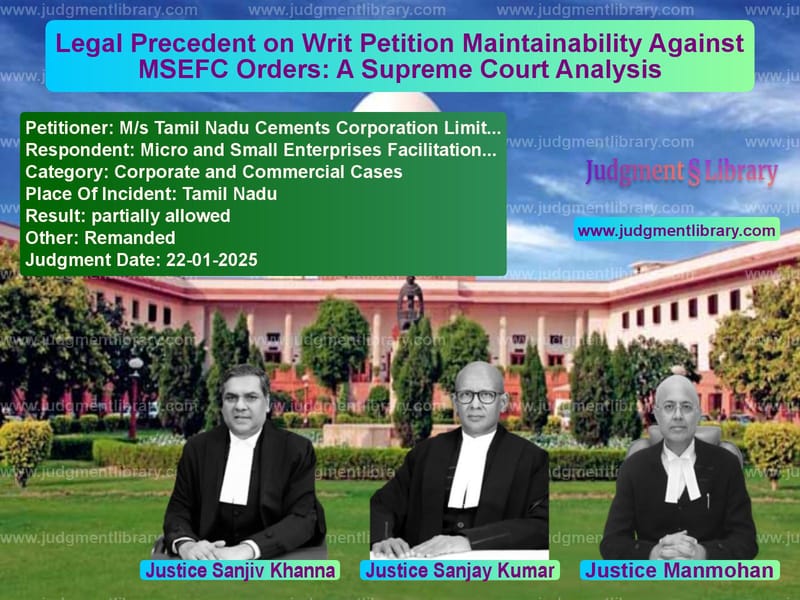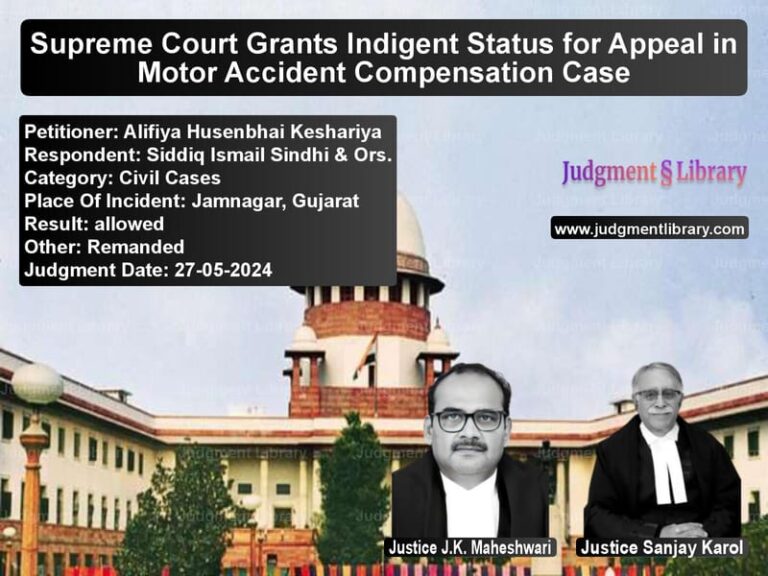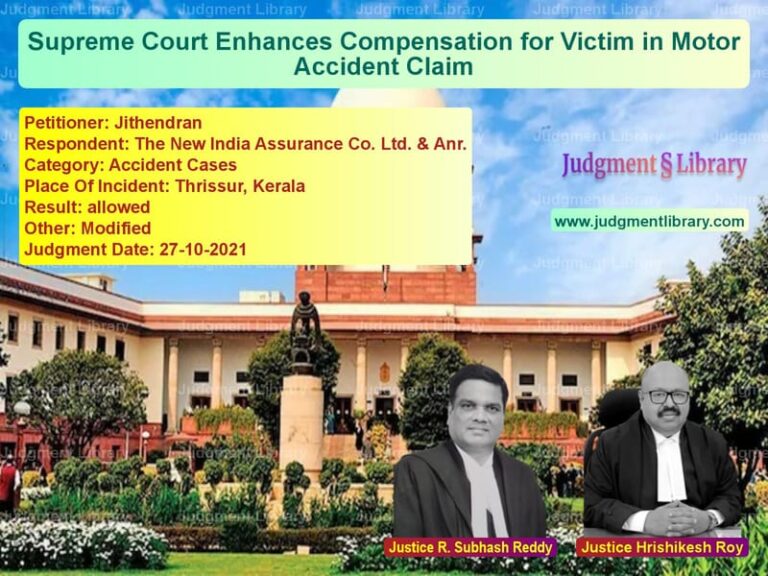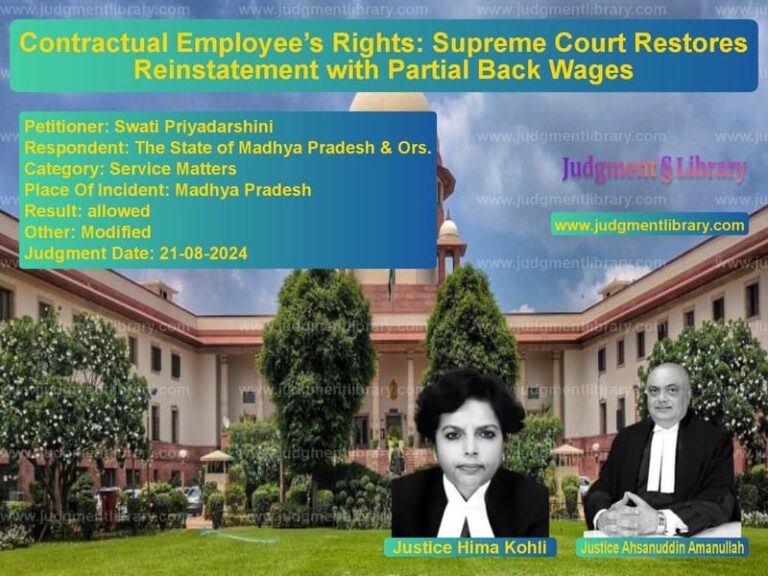Legal Precedent on Writ Petition Maintainability Against MSEFC Orders: A Supreme Court Analysis
The Supreme Court recently delivered a judgment in the case M/s Tamil Nadu Cements Corporation Limited v. Micro and Small Enterprises Facilitation Council and Another, which addresses the critical issue of whether a writ petition can be filed against an order passed by the Micro and Small Enterprises Facilitation Council (MSEFC) under the provisions of the Micro, Small, and Medium Enterprises Development Act, 2006 (MSMED Act). The Court considered whether the constitutional right to file a writ petition overrides the statutory remedies provided under the MSMED Act, particularly in disputes involving payment issues between suppliers and buyers.
The appellant, Tamil Nadu Cements Corporation Limited (TANCEM), challenged the orders issued by MSEFC, which had led to the attachment of its property after failing to adhere to the award given by MSEFC. The case presented a legal crossroads, considering the statutory framework of the MSMED Act and the judicial review power under Article 226 of the Constitution of India. This blog post will delve into the judgment, examining key legal arguments, judicial observations, and the final decision by the Court.
Background of the Case
The dispute in question began when TANCEM had awarded a contract to M/s Unicon Engineers for the design, supply, and installation of Electrostatic Precipitators (ESPs) at its cement manufacturing unit. The project was delayed, and the quality of the equipment supplied was subpar, prompting TANCEM to seek modifications and repairs. The issues culminated in M/s Unicon Engineers filing a petition before MSEFC, seeking a payment of Rs. 2.66 crore for the work completed and the additional expenditures incurred due to delays.
Read also: https://judgmentlibrary.com/supreme-court-clarifies-financial-creditor-status-in-insolvency-cases/
In the course of the proceedings, TANCEM was directed to make payments to M/s Unicon Engineers. However, TANCEM contested the payment, citing the failure of M/s Unicon Engineers to complete the project satisfactorily. Despite objections, MSEFC passed an order in favor of M/s Unicon Engineers, directing TANCEM to pay a substantial amount. TANCEM filed a petition before the High Court, challenging the execution of the order and the vires of the MSMED Act, leading to this appeal before the Supreme Court.
Key Legal Issues
- Whether a writ petition is maintainable against an order passed by MSEFC acting in its capacity under the MSMED Act, or whether statutory remedies under the MSMED Act must be followed.
- Whether the MSEFC can act as both a conciliator and arbitrator in disputes between suppliers and buyers, particularly under Section 18 of the MSMED Act.
- The applicability of Sections 16 to 19 of the MSMED Act and the ability of the High Court to exercise writ jurisdiction in light of these provisions.
- Whether the statutory remedies provided under the MSMED Act, including the appeal process under Section 34 of the Arbitration and Conciliation Act, 1996 (A&C Act), preclude the filing of a writ petition under Article 226 of the Constitution.
Arguments of the Parties
Petitioner’s Arguments
The appellant, represented by TANCEM’s counsel, raised the following points:
- The writ petition under Article 226 was maintainable as the statutory remedy was inadequate. The appellant argued that the provisions of the MSMED Act, especially with respect to Section 18, did not preclude judicial review by a High Court in certain exceptional circumstances.
- The Court should intervene because the order passed by MSEFC was legally flawed. The appellant argued that the MSEFC had acted beyond its jurisdiction in issuing the award without considering the broader context of the contractual dispute.
- The appellant contended that the attachment of its property and the pre-deposit condition under Section 19 of the MSMED Act, which required a 75% pre-deposit, placed undue financial strain on the company.
- The decision by MSEFC to conduct arbitration, while also acting as a conciliator, created a conflict of interest and violated the principles of fairness in dispute resolution.
Respondent’s Arguments
The respondents, represented by M/s Unicon Engineers and MSEFC, argued the following:
- The writ petition was not maintainable, as the MSMED Act provides specific statutory mechanisms for challenging MSEFC’s orders, particularly under Section 34 of the A&C Act, which governs disputes arising from arbitration awards.
- The MSEFC’s role as both a conciliator and arbitrator was explicitly authorized under Section 18 of the MSMED Act, and the procedures were in line with the provisions of the A&C Act, ensuring that the dispute was resolved in a legally sound manner.
- Section 19 of the MSMED Act mandates the pre-deposit of 75% of the awarded amount, and the appellant’s failure to comply with this requirement should not prevent the execution of the award.
- The respondents emphasized that the MSEFC had followed all required legal procedures, and the appellant’s objections to the payment and award were unfounded.
Supreme Court’s Observations
The Supreme Court, after considering the arguments presented by both parties, made several key observations:
“While it is well-established that alternative statutory remedies should be exhausted before invoking writ jurisdiction, the writ courts are not divested of their jurisdiction under Article 226 in exceptional cases. These include cases where there is a violation of constitutional rights, principles of natural justice, or when the order or action is wholly without jurisdiction.”
The Court observed that while the MSMED Act provides a specific remedy, including conciliation and arbitration under Section 18, there were circumstances where the writ jurisdiction could still be invoked, particularly when fairness and justice demand it. The Court also pointed out that the statutory scheme of the MSMED Act does not automatically bar judicial intervention, especially in cases involving potential abuse of power or when the statutory remedy itself is inadequate or burdensome.
Final Judgment and Directions
The Supreme Court, after considering the facts and legal precedents, ruled as follows:
- The Court referred the matter to a larger Bench to examine the maintainability of writ petitions against orders passed by MSEFC, specifically regarding whether the writ petition could be barred completely or if exceptions could apply.
- The Court emphasized that while the statutory remedies under the MSMED Act should generally be followed, there are exceptions where writ jurisdiction may be exercised if there is a violation of justice, fairness, or constitutional rights.
- The Court directed the Registry to place the matter before the Chief Justice to form a larger Bench to address the questions raised regarding writ jurisdiction and the role of MSEFC as both conciliator and arbitrator.
- The decision in this case would set a significant precedent for future cases where statutory remedies under specialized laws, like the MSMED Act, are challenged on grounds of fairness and access to justice.
Implications of the Judgment
This judgment clarifies the scope of judicial intervention under Article 226 of the Constitution in cases involving statutory bodies like MSEFC. It underscores that while statutory remedies must be exhausted, exceptional cases may warrant judicial review, especially when constitutional rights are at stake. The Court’s decision to refer the matter to a larger Bench will have wide-reaching implications for the enforcement of arbitration awards and the execution of orders passed by statutory authorities.
Conclusion
The Supreme Court’s ruling in M/s Tamil Nadu Cements Corporation Limited v. Micro and Small Enterprises Facilitation Council addresses important legal questions concerning writ jurisdiction, statutory remedies, and the role of MSEFC in resolving disputes between suppliers and buyers. The judgment emphasizes the importance of fairness, justice, and constitutional rights, ensuring that access to justice is not impeded by procedural hurdles. As this case is referred to a larger Bench, the final ruling will likely shape the future of dispute resolution under the MSMED Act.
Petitioner Name: M/s Tamil Nadu Cements Corporation Limited.Respondent Name: Micro and Small Enterprises Facilitation Council and Another.Judgment By: Justice Sanjiv Khanna, Justice Sanjay Kumar, Justice Manmohan.Place Of Incident: Tamil Nadu.Judgment Date: 22-01-2025.
Don’t miss out on the full details! Download the complete judgment in PDF format below and gain valuable insights instantly!
Download Judgment: ms-tamil-nadu-cemen-vs-micro-and-small-ente-supreme-court-of-india-judgment-dated-22-01-2025.pdf
Directly Download Judgment: Directly download this Judgment
See all petitions in Company Law
See all petitions in Corporate Governance
See all petitions in Bankruptcy and Insolvency
See all petitions in Judgment by Sanjiv Khanna
See all petitions in Judgment by Sanjay Kumar
See all petitions in Judgment by Manmohan
See all petitions in partially allowed
See all petitions in Remanded
See all petitions in supreme court of India judgments January 2025
See all petitions in 2025 judgments
See all posts in Corporate and Commercial Cases Category
See all allowed petitions in Corporate and Commercial Cases Category
See all Dismissed petitions in Corporate and Commercial Cases Category
See all partially allowed petitions in Corporate and Commercial Cases Category







